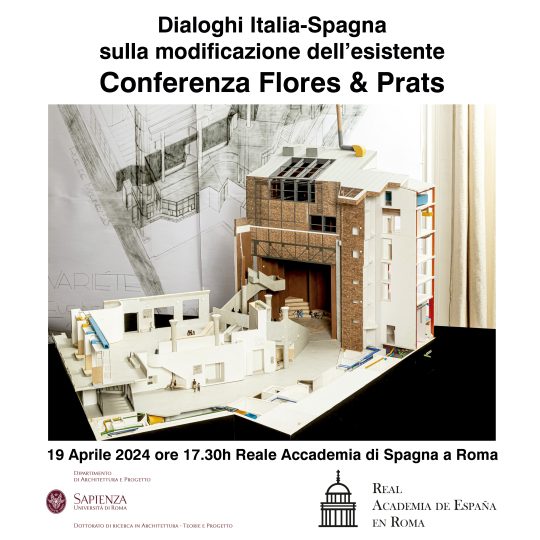
Conferenza di Flores & Prats – Dialoghi Italia-Spagna sulla modificazione dell’esistente
19h April 2024
Reale Accademia di Spagna, Piazza San Pietro in Montorio 3, Roma
Organizer: Università Sapienza di Roma and Real Academia de España en Roma
Participants: Eva Prats and Ricardo Flores, Guillermo Vazquez Consuegra, Labics, Elias Torres Tur, Carmen Andriani
Curators: Orazio Carpenzano and Gianpaola Spirito
Interventions of stratification, reuse, and modification of existing heritage have always been carried out. Since ancient times, architecture has been modified to adapt to new needs, stratifying the existing, replacing parts of it, forming complex palimpsests. This has resulted in Italian and Spanish cities being characterized by the sedimentation of a vast architectural heritage that over time has undergone interventions of modification, reuse, and expansion, with architectures in various forms inscribing themselves into the built environment, requalifying the contexts in which they are located.
In the 21st century, a renewed sensitivity to the environment and a greater awareness of finite resources – among which heritage is also included – have returned architectural debate attention to the themes of reuse and modification of the existing. This series of conferences, led by internationally renowned Italian and Spanish architects from different generations, who have designed transformations of existing heritage, reurbanizing and enhancing parts of the city; to activate a reflection on the various methods and processes of understanding contexts and pre-existing conditions and intervention methods; promote debate and discussion among architects from different backgrounds and cultures, restorers, and other figures and institutions involved in the conservation and enhancement of heritage.
The lecture that Ricardo Flores and Eva Prats presented was focused on the theme of adaptation and reuse, fundamental for todays and future architecture. They exposed their recent participation in the Venice Architecture Biennale, where they brought these themes to life through a workshop, using open materials that encourage debate and exchange on how to engage with the many invisible authors that are part of the buildings we inherit, and how we used all this legacy, not only physical but also immaterial and emotional. A topic that changes with each project, opening a new universe every time.